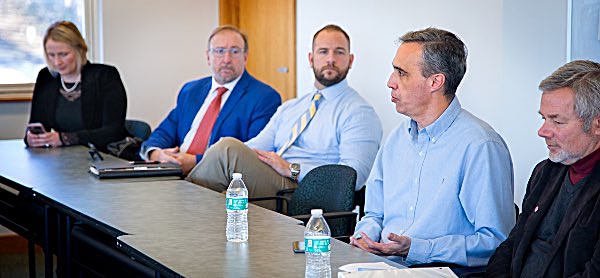- By Lindsey Hadlock
- Business & Technology
 Print
Print  Jack and Rilla Neafsey Cornell Tech Dean Dan Huttenlocher, speaking with the Tompkins County Chamber of Commerce during a lunch meeting Dec. 19 in Ithaca.
Jack and Rilla Neafsey Cornell Tech Dean Dan Huttenlocher, speaking with the Tompkins County Chamber of Commerce during a lunch meeting Dec. 19 in Ithaca.Cornell Tech, which moved into and dedicated its new campus on Roosevelt Island in New York City just three months ago, is not only continuing to grow into its new space, but also has heightened excitement and interest in Cornell University and its campuses across the board, said Dan Huttenlocher, the Jack and Rilla Neafsey Dean of Cornell Tech.
Huttenlocher gave an update on the graduate school campus Dec. 19 at the Tompkins County Chamber of Commerce, where he spoke for about a half hour and took questions during a meeting of the chamber's Government and Community Affairs Committee. Prior to that session, Huttenlocher met with local elected officials and business leaders over lunch.
Cornell Tech now has more than 300 graduate students, Huttenlocher said – 45 Ph.D. students and 260 master's degree students – across a wide range of fields that include programs with the Cornell SC Johnson College of Business, Cornell Law School and dual-degree programs with the Technion-Israel Institute of Technology. There are now about 50 faculty members, 25 tenure-track and 25 practitioner faculty, he said. In 10 years the campus is expected to enroll about 800-850 students and have about 50 tenure-track faculty.
But the population of the graduate school campus today is still very small in context, Huttenlocher said, noting that it is still outnumbered by nearly any individual science or engineering department on the Ithaca campus.
"We are trying to punch way, way, way above our weight," he said. "We're focused on digital technology and societal economic impact, with a focus on that impact in New York, [and] regionally and nationally as well."
Huttenlocher updated the committee on the mostly completed first phase of the physical campus, including the recently inaugurated Tata Innovation Center, formerly called The Bridge, and described the campus's 12-acre footprint on the mostly residential, 100-acre Roosevelt Island.
The elevated profile that Cornell Tech has been enjoying in New York City, from the university's winning bid in late 2011 to build the campus through the dedication this fall, has had extensive positive effects universitywide, Huttenlocher said. He noted that there were more than 1,500 media stories alone related to the September campus dedication that reached about 800 million people.
"That builds brand awareness for Cornell University broadly," he said. "There's no substitute for your name being in front of people."
Noting the strong and permanent ties between Cornell Tech and the Ithaca campus, Huttenlocher said that all professorial-ranked faculty at Cornell Tech are appointed jointly with a school, college or department at the Ithaca campus.
"That builds close ties and is a very deliberate part of our structure," he said, "and it has built very strong research ties, which we are actively incentivizing by subsidizing faculty and Ph.D. student travel between the campuses for research collaborations."
The result is that every Cornell Tech faculty member who has been with the school a year or more now has at least one jointly funded research project with an Ithaca faculty member. That brings additional research dollars to the Ithaca campus as well as to Cornell Tech, he noted; and it marks how connections between the campuses have grown culturally.
Huttenlocher detailed Cornell Tech's commitment to New York City public schools, which includes computing education programs and outreach activities. Much of this work with public school teachers and students is also now enhancing and expanding Cornell's work with schools and districts in Ithaca and Tompkins County.
In addition, about 38 startup companies have been spun out of Cornell Tech in the past four years, Huttenlocher said – a huge per capita number based on the relatively small number of students.
Cornell Tech has worked closely with the New York City community of early stage companies and early stage investors to get Cornell Tech students well connected and engaged. The ongoing efforts have paid off: About 80 percent of the startups spun out of Cornell Tech are located in New York City, Huttenlocher said. "In previous years, they would have gotten on an airplane and gone to Silicon Valley and never looked back."
v14i1




